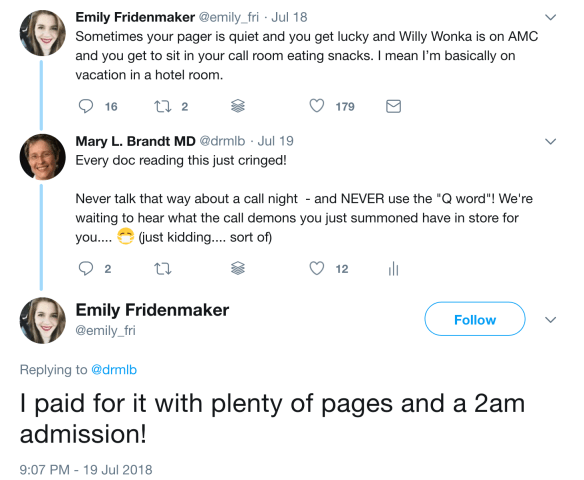It has been said that the Inuit people have a hundred words for snow. When you live in a dangerous environment, it’s important to learn the variations of snow to survive. But, when you look into the origin of the “hundred words for snow”, it turns out it’s not exactly true – Inuits don’t have more words for snow than other languages…Their detailed understanding of snow is a lived, not spoken vocabulary.

The same is true for those who spend nights awake working in a hospital. We, too, have a lived vocabulary that includes hundreds of subtle variations of fatigue, even though we don’t have words to describe them. (The closest I’ve come to being able to describe this fatigue is in “sleep equivalents”, specific events or things that makes you feel like you have had more sleep than you actually did. For example, a shower after being up all night can give you the equivalent of anywhere from 20 to 60 minutes of sleep depending on how tired you are. Brushing your teeth after a hard night of call is usually 5-10 minute sleep equivalent. A good strong cup of coffee can be as much as 45 minutes of sleep equivalent – although it’s important to titrate it so you don’t end up with anxious jitters instead of just being awake.)
Knowing how to manage this level of fatigue it is part of medical training. (Don’t get me wrong… I’m not advocating that trainees must get tired on a regular basis to “learn how to manage it”) Learning to successfully manage the fatigue of long days and nights on call hinges on two things and both have to do with deliberate choices.

Learning not to trust your first instinct if you are sleep deprived is the first important lesson. Even if it’s a drug you know well, or the chest x-ray looks ok, stop and be deliberate. Consciously review the data, look at the options and, for really important decisions, ask someone to look at the situation with you.

The second lesson in managing fatigue is maybe even more important. The bone deep fatigue of medical training is not solely the result of sleep deprivation. When you stay up all night you also lose the liminal spaces of waking and falling asleep, the threshold between night and day. In scientific terms, this means there is a major disruption of your circadian rhythms. But it’s more than just physiology. The drowsy moments between sleep and being awake take place in the liminal spaces of dawn and dusk. We lose more than orientation to daylight when we lose this liminal space. The Irish poet and priest John O’Donoghue, teaches that liminal spaces are moments and places where the spiritual touches the finite. By losing the profoundly important rhythm of rest – including these liminal spaces – we end up physiologically, psychologically, and spiritually unmoored.
You have to be deliberate here, too. By trial-and-error work to find the things that ground you, the things that help you recover in a deeper way than just catching up on the sleep. Make lists of anything and everything that helps you recover from call for the times you are too tired to remember or choose. Look at those lists before you leave for your call day and choose something to do for yourself when you leave the hospital the next day. It might be going to the gym for a light workout, having a great cup of coffee in a cafe, a slow, grateful walk outside, playing with a pet, a hug from a loved one…or finding a way to “play” outside.

May the sacrifice of time and sleep you make for others come back to you as joy … and may you find deep rest in knowing you make a difference in so many lives.


















